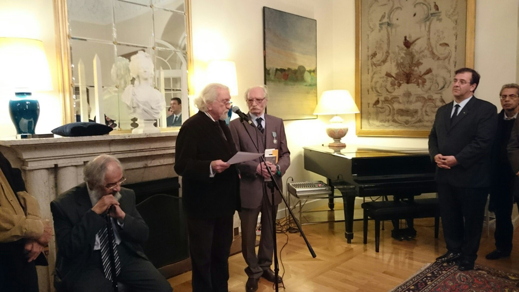French ambassador to Iran, Bruno Foucher, has presented Mahmoud Dowlatabadi, a veteran Iranian writer, with the prestigious award of France’s Chevalier of the Ordre des Arts et des Lettres.
The Islamic Republic News Agency (IRNA) reported on November 17 that the award which bears the signature of France’s culture minister was handed to the Iranian author in a ceremony in the residence of Ambassador Foucher in Tehran.
The French ambassador, Dariush Shayegan – a prominent thinker – and Mariam Asgari – the translator of Missing Soluch, a novel written by Dowlatabadi – took the stage in the event and talked about the different aspects of Dowlatabadi’s literary works.
The French envoy said that the intellectual society and book lovers in his country have gained greater familiarity with the Iranian writer since the release of his works in France. He also highlighted the standout features of Dowlatabadi’s play, story and novel writing.
Shayegan, for his part, said, “Dowlatabadi is undoubtedly one of the biggest novelists in contemporary Iran. To create his works, he did not drink 50,000 cups of coffee – like what Honoré de Balzac did in the matter of 20 years at the expense of his life to create The Human Comedy, a literary masterpiece of the 19th century.
He further said, “However, Dowlatabadi penned Kelidar – one of the most attractive and biggest rural epics of modern Iran – in the course of 15 years after going through many ups and downs.”
Dowlatabadi hails from Khorasan, the birthplace of Iran’s literature and philosophy, Shayegan said, adding that the great writer has embodied both the greatness of this land and its scars.
He further hailed Dowlatabadi’s intellectual honesty and world-class novelty in a media-addled world and said, “Like any other true artist, Dowlatabadi is sensitive and full of stress. He’s been hurt by something from inside, and is concerned about those individuals whose brave dreams always stay in conflict with petty realities in a world which looks the other way when it comes to the internal and heartfelt desires of truth and freedom seekers.
“This unknown, or less-known, Sphinx – who knows, perhaps he is widely known. – is a man in exile in his internal quest of self-enlightenment.”
Mariam Asgari was the next speaker who explained how she rendered Missing Soluch from Farsi into French.
“A translator is always dissatisfied and I had a dissatisfied feeling all the way as I translated the book. For me, translating Missing Soluch was equal to translating an entire region; it was the translation of a culture and a history. […]”
Later France’s Chevalier of the Ordre des Arts et des Lettres was conferred upon Dowlatabadi, who in turn thanked the French culture minister, the French ambassador in Tehran and France’s cultural attaché.
The veteran Iranian writer talked about writing and the pain associated with it, and then read parts of Eugène Ionesco and Marcel Proust’s works, raising some points about the French civilization and literature.
The ceremony was attended by big literary and art names such as: Dariush Shayegan, Nasrollah Pourjavadi [a university professor], Kambiz Derambakhsh [a cartoonist and graphic designer], Omid Rouhani [an actor and film critic], Taraneh Shayegan, Sedigh Tarif [a traditional singer], Leili Golestan [a translator], Mahdi Ra’fat, Javad Mojabi [a poet, writer and researcher], Kianush Ansari, Media Kashigar, and Fakhreddin Fakhreddini [a painter], as well as Davood Mousaei and Hassan Kiaeyan (publishers of Dowlatabadi’s works).
Kelidar is a saga about a Kurdish nomadic family. The ten-volume book is praised for its heroic, lyrical, and sensual language as well as its detailed portrayal of political and social upheaval. Dowlatabadi spent over a decade writing the book.
In Missing Soluch, an impoverished woman raises her children in an isolated village after the unexplained disappearance of her husband, Soluch. It was his first work which was translated into English.
Thirst (Persian: Besmel) is a novel on the Iran-Iraq war (1980-1988). It is written mostly from the perspective of an Iraqi.
The Colonel is a novel about nation, history, and family. It is the story which unfolds during and after the Islamic revolution in Iran in the 1980s. This book, whose translations into German and English are available in international markets, has yet to be published in Iran. The Ministry of Culture and Islamic Guidance says that the content of The Colonel needs to be revised before it is given the go-ahead to go to press.
Dowlatabadi said in a ceremony also attended by a deputy culture minister on November 16 that he has some complaints to make about his authorship rights which have been trampled for years.
In August 2014, Iran issued a commemorative postage stamp for Mahmoud Dowlatabadi.
